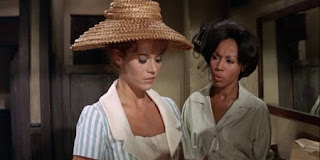Year: 1967
Genre: Family Drama
Directed: Otto Preminger
Stars: Michael Caine, Jane Fonda, John Phillip Law, Diahann Carroll, Robert Hooks, Faye Dunaway, Burgess Meredith, Loring Smith, George Kennedy, Luke Askew, Beah Richards, Madeleine Sherwood, Donna Danton
If Otto Preminger's Hurry Sundown is guilty of anything, it's biting off more than it can chew. With a 146 minute running time, a clutter of stars and characters, and what seems like a jumble of conflicting themes, Hurry Sundown has been seen by many critics as opportunistic rabble-rousing, overtly melodramatic and clunky. But if you look past Preminger's drive to get attention and Michael Caine's questionable southern accent, you may find a wholly entertaining film or failing that, a period piece that encapsulates the feelings of its maker/s at a time when such issues as racism ran rampant.
When a cannery looks to buy large plots of uncultivated farmland, local big cheese Henry Warren (Caine) enthusiastically becomes partners to the plan selling his wife Julie's (Fonda) family's land at a profit. However, to make the deal he must convince his cousin Rad (Law) and his wife's old mammy Rose (Richards) to sell their plots as well. When Rose dies of a heart attack, her son Reeve (Hooks) becomes landowner but is then sued for ownership by Henry. Reeve and Rad must then work together to fight battles both real and legal to keep their homes from being destroyed.
The lack of tact in this film is stupefyingly brilliant. With the bluntness of TNT, Hurry Sundown creates not characters but caricatures. George Kennedy makes an appearance as a bumbling Sheriff, Burgess Meredith as a bigoted judge and Madeleine Sherwood as the saintly teacher who eggs Reeves on. All you need is a snooty butler and a buxom blonde bimbo and you got yourself a stock character Christmas. Still it's in their simplicity that you find the true virtue of the film. Their is no nuance in racism, nor is their any when you're exploiting friends and family like Henry does. The good guys are good, the bad guys are bad, their is no in-between and for better or worse, Preminger seems to feel very strongly about that fact.
Racism is the primary theme and focus of Hurry Sundown but it is by no means the only theme, nor the only controversy during release. sexuality and fidelity have their time in the sun as well. Rad and his wife Lou (Dunaway) enjoy a healthy sex life while Henry and Julie sexually frustrate each other to the point of violence. Preminger really does seem to take delight in toying with the emotions of his characters (as well as taking suggestive camera shots), as shown when Fonda attempts to seduce Henry with his own saxophone. In addition, family relationships, greed, corruption, religion are also expanded on, creating a solid if hyperbolic worldview. Like a splatter painting its messy yet colorful.
All in all, Hurry Sundown has the pulpy sensationalism you can expect from an Otto Preminger production. His passion for the material shines through even when the story strays into melodrama. While filming in Louisiana, locals attempted to sabotage filming to the point of sniping a convoy of cast and crew members. It reminds me of an adage I once heard; "If they're shooting at you, you're doing something right."
Final Grade: B-




No comments:
Post a Comment